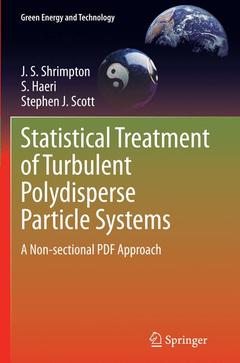Statistical Treatment of Turbulent Polydisperse Particle Systems, 2014 A Non-sectional PDF Approach Green Energy and Technology Series

In this book we will introduce the modeling process of turbulent particulate flows which are encountered in many engineering and environmental applications. These types of flows usually also involve heat and mass transfer and turbulence adds another dimension to the complexity of the problem and hence a rigorous mathematical treatment is usually required. This required mathematical background makes the learning curve for new research students and practicing engineers extremely steep. Therefore modeling process for new or existing problems is extremely slow and is usually restricted to minor improvements to the to the available models.
In this book we try to gather the required mathematical knowledge and introduce them more intuitively. Many numerical simulations of basic processes and equation will be given to provide the reader with a physical understanding of the different terms in the underlying equations. We will start the modeling process from a mesoscopic level which deals with the system of an intermediate length scale between the size of the atoms or molecules and the bulk of the material. This provides a unique opportunity for the reader to intuitively add different phenomena to their models and equipped with the necessary mathematical tools derive the final models for their problems.
Chapter 1 Introduction.- Chapter 2 PDF Method : A Stochastic Framework.- Chapter 3 Eulerian - Eulerian Field Equations.- Chapter 4 A poly-dispersed EE model.- Chapter 5 Closure Problem.- Chapter 6 PDF Reconstruction Methods.
Date de parution : 09-2016
Ouvrage de 122 p.
15.5x23.5 cm
Date de parution : 07-2014
Ouvrage de 122 p.
15.5x23.5 cm
Disponible chez l'éditeur (délai d'approvisionnement : 15 jours).
Prix indicatif 52,74 €
Ajouter au panier


